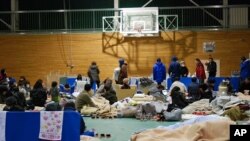In addition to the one-half-million people made homeless by last week's magnitude-9.0 quake and huge tsunami, there are 200,000 more Japanese who have been ordered from their homes.
They were living near a crippled nuclear power plant, severely damaged by the natural disaster that has been leaking radiation.
But now, the Koriyama High School gymnasium is home, indefinitely, for more than 350 evacuees from Okuma, the town where the Fukushima-1 nuclear facility is located.
Below the basketball nets, a few radios are on in this high school gymnasium, but no one really seem to be listening.
Emporer's message
Japan's Emperor, Akihito, is making an unprecedented national address. The Emperor says he is deeply worried about the nuclear crisis and calls on his subjects, in this difficult time, to act compassionately.
Some volunteers had already heeded his request, bringing bottled water and boxes of strawberries here.
The evacuees began arriving Sunday aboard buses of the Japan Self Defense Forces. Others drove themselves out of the evacuation zone. Most arrived with a little more than a change of clothing and blankets.
Daily life
But compared to the plight of those isolated in communities swamped by the tsunami, the evacuees here are relatively well off. There are toilets, one hot meal a day, a few kerosene heaters and several of the remaining open stores and a public bath house are within a 30-minute walk.
Harumi Takahashi is here with several children and grandchildren. When asked about the white smoke and invisible radiation billowing from the damaged nuclear plant near her home in Okuma, she replies that it is difficult to render an opinion.
Takahashi says she is not receiving any information. And she complains that without a television, they are not able to view the graphic images of the crippled reactors that are being broadcast to the rest of the country.
Changing opinions
Another evacuee, Keishu Maeda, used to work at the Fukushima nuclear plant. He says the events of the past few days have changed his opinion.
"I think I was a good supporter for the [Japanese] atomic energy policy, but not anymore,." says Maeda.
Others in the shelter, on the verge of tears, say they were always opposed to the construction of nuclear reactors in their town.
One thing everyone here does appear to agree on is, that with the nuclear crisis still unfolding, they will have plenty of time think about their plight, sitting and sleeping on the hardwood floor of a basketball court.




